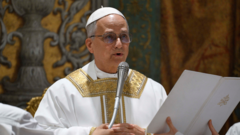*Pope Leo XIV, formerly Cardinal Robert Francis Prevost, celebrates his first Mass as the first American pontiff, entering the papacy amidst international expectations and a complex global landscape.*
**Papal Transition: The First American Pope Leo XIV Prepares to Lead the Church**

**Papal Transition: The First American Pope Leo XIV Prepares to Lead the Church**
*Pope Leo XIV emerges as a bridge-builder in his inaugural address, addressing the urgent future of the Catholic Church.*
Pope Leo XIV's election as the first American pontiff has sent ripples through the global Catholic community, setting the stage for a new era in the Roman Catholic Church. Born Robert Francis Prevost in Chicago and having spent two decades serving as a bishop in Peru, Leo XIV will celebrate his inaugural Mass today, stepping into his role amidst pressing challenges facing the Church.
During his opening address from the balcony of St. Peter’s Basilica, Leo XIV received jubilant cheers from the crowd, where he emphasized his commitment to "building bridges” and acknowledged the legacy of Pope Francis, without detailing his governance approach. Leo XIV's election is significant as he represents a blend of American and Latin American identities, marking a departure from past papal traditions where an American figure would have been a controversial choice.
His profile resonates with both American Catholics—whose representation in the Church has remained stable—and Latin American communities, where Catholicism thrives. As he embarks on this journey, key discussions will revolve around the Church’s social teachings and global engagement amidst rising nationalism.
As the new pope reflects the keen themes of accessibility and reform championed by his predecessor, church analysts have noted that Leo XIV possesses an understanding of the Church’s modern landscape, having previously led the Pontifical Commission for Latin America. His dual nationality allows him to resonate with diverse congregations, yet his American heritage presents a symbolic shift in the Vatican's global representation.
Reaction within his family and from colleagues is filled with anticipation of how Leo XIV may navigate the complexities of papal duties. In addition to carrying forth social doctrines, friends and family also highlight Leo's inclination to address humanitarian issues, such as immigration, though expectations suggest he may approach these conversations with a more reticent demeanor compared to his predecessor.
As the Church stands at a crossroads defined by changing demographics and sociopolitical challenges, Pope Leo XIV's leadership will be pivotal in defining the future direction of Catholicism. With his upcoming engagements including meetings with journalists and Mass celebrations across key Vatican spaces, the assembled cardinals and global observers are keenly watching to glean insights into how he will shape the Church in this contemporary context.
During his opening address from the balcony of St. Peter’s Basilica, Leo XIV received jubilant cheers from the crowd, where he emphasized his commitment to "building bridges” and acknowledged the legacy of Pope Francis, without detailing his governance approach. Leo XIV's election is significant as he represents a blend of American and Latin American identities, marking a departure from past papal traditions where an American figure would have been a controversial choice.
His profile resonates with both American Catholics—whose representation in the Church has remained stable—and Latin American communities, where Catholicism thrives. As he embarks on this journey, key discussions will revolve around the Church’s social teachings and global engagement amidst rising nationalism.
As the new pope reflects the keen themes of accessibility and reform championed by his predecessor, church analysts have noted that Leo XIV possesses an understanding of the Church’s modern landscape, having previously led the Pontifical Commission for Latin America. His dual nationality allows him to resonate with diverse congregations, yet his American heritage presents a symbolic shift in the Vatican's global representation.
Reaction within his family and from colleagues is filled with anticipation of how Leo XIV may navigate the complexities of papal duties. In addition to carrying forth social doctrines, friends and family also highlight Leo's inclination to address humanitarian issues, such as immigration, though expectations suggest he may approach these conversations with a more reticent demeanor compared to his predecessor.
As the Church stands at a crossroads defined by changing demographics and sociopolitical challenges, Pope Leo XIV's leadership will be pivotal in defining the future direction of Catholicism. With his upcoming engagements including meetings with journalists and Mass celebrations across key Vatican spaces, the assembled cardinals and global observers are keenly watching to glean insights into how he will shape the Church in this contemporary context.




















